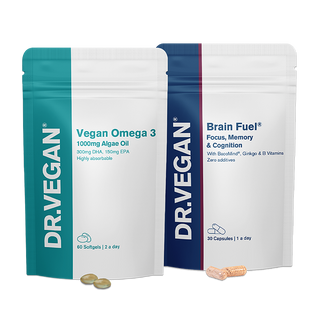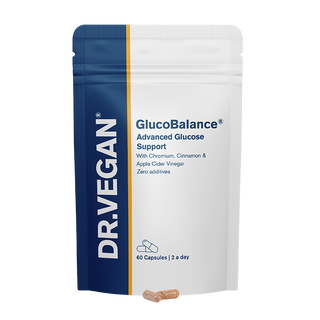Is sugar actually that bad for you?

Having a craving for a little bit of sweetness is perfectly normal, however, too much sugar can have serious health consequences. The little voice at the back of our minds reminds us we shouldn’t be eating too many sugary treats, but it isn’t always that simple!
Hear from nutritional therapist, Isabelle Nunn (MPharm, Dip NT), as we explore the world of sugar, its impact on our health, and how to overcome those sugar cravings.
Why is sugar bad for you?
Eating too much sugar can negatively affect the health of your gut, brain and heart as well as impacting blood sugar levels. It can also cause excessive weight gain and the onset of type 2 diabetes to name a few health risks.
You may be interested in reading our expert nutritionist's 'Debunking the Biggest Food Myths'.
How sugar affects gut health
A diet high in sugar can cause excess fermentation in the gut and contribute to a lot of discomfort. Bloating, excess wind and a worsening of symptoms associated with conditions like irritable bowel syndrome (IBS) can occur.
What's your diet missing? Find out for free in your Diet Profile.
Sugar impacts on our gut's microbiome, the trillions of bacteria that naturally live on our bodies and within us. Bacteria play a fundamental role in our health, from our mood and energy, sleep and immunity. They're also vital to the healthy release of gas and our bowel movements - learn more in what do your farts say about your health?.
A high sugar intake disrupts that delicate balance of bacteria in our gut, increasing the levels of bad bacteria while reducing that of healthy, supportive bacteria. Find out more in why you should improve your gut health.
How sugar affects brain health
Excessive levels of sugar can cause changes in the brain's decision making, learning ability and memory. Studies show high sugar intake can:
- Increase chemicals in the brain linked to inflammation, affecting learning abilities, focus and general cognitive function.
- Affect our memory function and our ability to create new memories.
- Influence our decision making - for example, making it hard to resist more cake!
Brain Health Bundle

How sugar affects blood sugar levels and heart health
Excess sugar causes a surge in the hormone 'insulin'. The body struggles to cope with the excess insulin, creating what's called 'insulin resistance' and putting us at risk of developing diabetes.
Excess insulin can play havoc with our sex hormones and affect our skin health, fertility and the menstrual cycle for women. Excess insulin can also lead to high blood pressure, in turn affecting heart health.
Discover the 10 symptoms of diabetes to look out for.
How much is a healthy amount of sugar per day?
In the UK the Department of Health recommend the following maximum daily sugar intake depending on age:
- Adults and teens: 30g
- Children 7-10 years old: 24g
- Children 4-6 years old: 19g
To give you a rough idea of the amount of sugar in different foods and drinks, a can of Coca-Cola contains 35g of sugar, and a normal glass of apple juice contains 10g of sugar. Below are other examples of the amount of sugar in foods:
- Royal Gala apple: 9.3g
- A pain au chocolat: 8.2g
- Glass of 150 ml of orange juice: 10g
How to reduce sugar intake?
Cutting out unnecessary sugar and unhealthy foods and drink is the easiest and most obvious starting point. For example, if you take sugar in your tea or coffee, which is approximately 4g per teaspoon, this is the first place to start. However, there are also many ‘added sugars’ in other foods including sauces, marinades, cereals or yoghurts.
The sweet stuff can sneak into your daily intake in unexpected ways and without you realising it. For example, most people don't realise one Actimel yoghurt contains 11g of sugar and one Yakult contains 10g of sugar. This is why reading food labels and cooking from scratch is a good place to start.
Discover lots of delicious recipes to cook the healthiest options, which just happen to be vegan-friendly too.
7 tips to reduce sugar cravings
Knowing what to eat when you’re craving sugar can help you to stop those cravings and prevent the health risks that come with eating too much sugar.
Remember that balance is key and it is important to enjoy your food, and if you follow these simple tips you can reduce your sugar cravings and sugar intake.
1. Choose dark chocolate
If you have chocolate or sweet cravings, opt for dark chocolate. Dark chocolate contains less sugar than milk chocolate and often contains gut-bacteria-loving antioxidants. Dark chocolate is also one of five foods that can improve your mood.
2. Protein and fibre
Consume a portion of protein and fibre at every meal. Learn more about the best protein sources on a plant-based diet.
3. Choose complex carbohydrates
As opposed to refined carbohydrates which can cause side effects including bloating, fatigue, IBS and much more, complex carbs including wholemeal bread, pulses and vegetables have a whole range of health benefits. You may enjoy our latest customer survey insights on gut health 'IBS causes and signs revealed'.
4. Increase Magnesium rich foods
Magnesium is an important mineral to help manage your insulin metabolism, which itself is needed to manage and regulate blood sugar levels. Good magnesium rich foods include almonds, tofu, legumes and wholegrain cereals. You may enjoy 'How do I know if I'm deficient in magnesium?'.
Magnesium Citrate

5. Exercise
It's part of the answer to so much of our health. Exercise supports the release of feel-good hormones called endorphins, helping overcome any anxiety related to sugar cravings, and supports the way the body manages your blood glucose levels.
6. Keep hydrated
Just 2% dehydration affects your ability to focus and concentrate, and research shows nearly two thirds of people say they regularly struggle to focus and concentrate. Staying hydrated helps keep your thirst under control, helps you feel fuller and keeps cravings at bay.
7. Supplements to manage blood sugar
GlucoBalance® is an advanced formula, which includes chromium, cinnamon, fenugreek seed, bitter melon and apple cider vinegar, to manage blood sugar levels and your blood glucose metabolism, helping protect against the highs and lows of blood sugar. Chromium can be obtained through foods but a deficiency is common. Learn more about GlucoBalance®.
Discover our range of award-winning vegan supplements and probiotics.
Want to hear more from our nutritionists? Sign up to our free newsletter for expert tips and advice:
You may also enjoy reading:
- Do meal replacement shakes work?
- Exposed: Plant-sweeteners and type 2 diabetes
- Best foods for Type 2 diabetes
- Does sperm impact the risk of diabetes?
- The link between yeast infections and diabetes
- Why the hype about Apple Cider Vinegar?
References:
- Leigh, S. and Morris, M (2020) Diet, inflammation and the gut microbiome: Mechanisms for obesity-associated cognitive impairment - ScienceDirect
- Saffouri, G. et al.(2019) Small intestinal microbial dysbiosis underlies symptoms associated with functional gastrointestinal disorders - PMC (nih.gov)
- Mantantzis, K. et al. (2019) Sugar rush or sugar crash? A meta-analysis of carbohydrate effects on mood - ScienceDirect
- Russell, W.R et al. (2016) Impact of Diet Composition on Blood Glucose Regulation - PubMed (nih.gov)
- Freeman, C. et al. (2018) Impact of sugar on the body, brain, and behavior (imrpress.com)
- Harber, VJ. and Sutton, JR (1984) Endorphins and Exercise | SpringerLink
- Barbagallo, M and Dominguez L,J. (2015) Magnesium and type 2 diabetes - PMC (nih.gov)
- Zafra-Stone, S. et al. (2007) Chromium Deficiency - an overview | ScienceDirect Topics
- NHS website Sugar: the facts - NHS (www.nhs.uk)



















